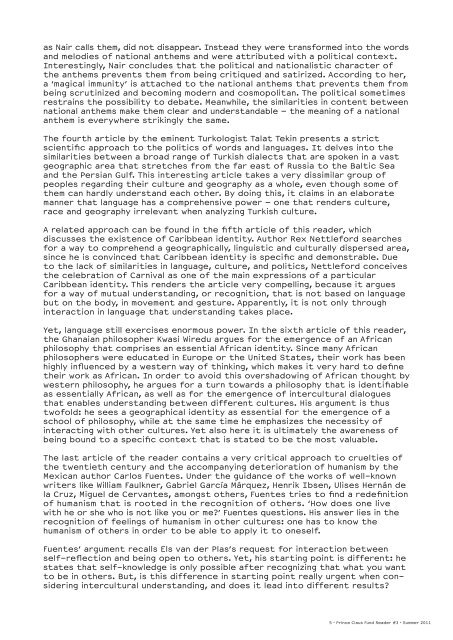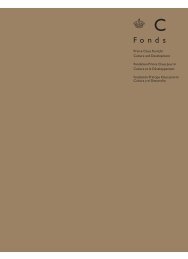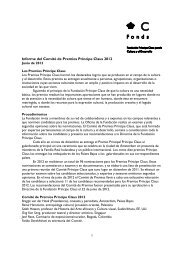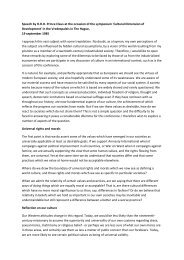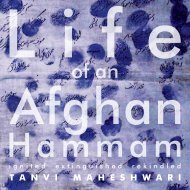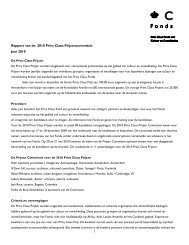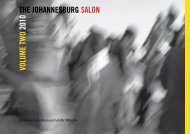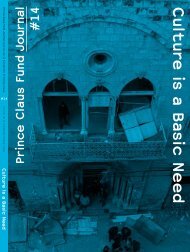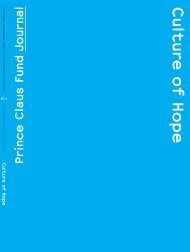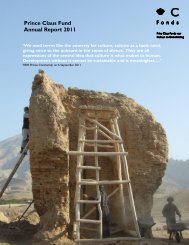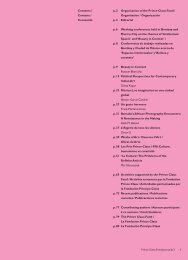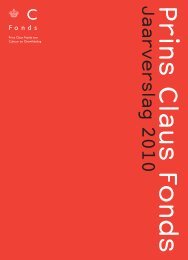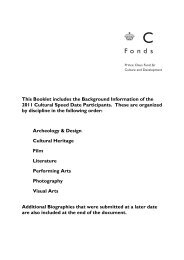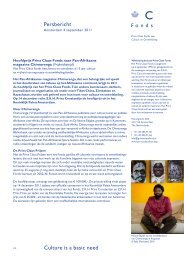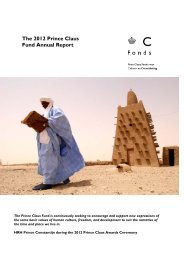3 summer 2011 - Prince Claus Fund
3 summer 2011 - Prince Claus Fund
3 summer 2011 - Prince Claus Fund
- No tags were found...
You also want an ePaper? Increase the reach of your titles
YUMPU automatically turns print PDFs into web optimized ePapers that Google loves.
as Nair calls them, did not disappear. Instead they were transformed into the wordsand melodies of national anthems and were attributed with a political context.Interestingly, Nair concludes that the political and nationalistic character ofthe anthems prevents them from being critiqued and satirized. According to her,a ‘magical immunity’ is attached to the national anthems that prevents them frombeing scrutinized and becoming modern and cosmopolitan. The political sometimesrestrains the possibility to debate. Meanwhile, the similarities in content betweennational anthems make them clear and understandable – the meaning of a nationalanthem is everywhere strikingly the same.The fourth article by the eminent Turkologist Talat Tekin presents a strictscientific approach to the politics of words and languages. It delves into thesimilarities between a broad range of Turkish dialects that are spoken in a vastgeographic area that stretches from the far east of Russia to the Baltic Seaand the Persian Gulf. This interesting article takes a very dissimilar group ofpeoples regarding their culture and geography as a whole, even though some ofthem can hardly understand each other. By doing this, it claims in an elaboratemanner that language has a comprehensive power – one that renders culture,race and geography irrelevant when analyzing Turkish culture.A related approach can be found in the fifth article of this reader, whichdiscusses the existence of Caribbean identity. Author Rex Nettleford searchesfor a way to comprehend a geographically, linguistic and culturally dispersed area,since he is convinced that Caribbean identity is specific and demonstrable. Dueto the lack of similarities in language, culture, and politics, Nettleford conceivesthe celebration of Carnival as one of the main expressions of a particularCaribbean identity. This renders the article very compelling, because it arguesfor a way of mutual understanding, or recognition, that is not based on languagebut on the body, in movement and gesture. Apparently, it is not only throughinteraction in language that understanding takes place.Yet, language still exercises enormous power. In the sixth article of this reader,the Ghanaian philosopher Kwasi Wiredu argues for the emergence of an Africanphilosophy that comprises an essential African identity. Since many Africanphilosophers were educated in Europe or the United States, their work has beenhighly influenced by a western way of thinking, which makes it very hard to definetheir work as African. In order to avoid this overshadowing of African thought bywestern philosophy, he argues for a turn towards a philosophy that is identifiableas essentially African, as well as for the emergence of intercultural dialoguesthat enables understanding between different cultures. His argument is thustwofold: he sees a geographical identity as essential for the emergence of aschool of philosophy, while at the same time he emphasizes the necessity ofinter acting with other cultures. Yet also here it is ultimately the awareness ofbeing bound to a specific context that is stated to be the most valuable.The last article of the reader contains a very critical approach to cruelties ofthe twentieth century and the accompanying deterioration of humanism by theMexican author Carlos Fuentes. Under the guidance of the works of well-knownwriters like William Faulkner, Gabriel García Márquez, Henrik Ibsen, Ulises Hernán dela Cruz, Miguel de Cervantes, amongst others, Fuentes tries to find a redefinitionof humanism that is rooted in the recognition of others. ‘How does one livewith he or she who is not like you or me?’ Fuentes questions. His answer lies in therecognition of feelings of humanism in other cultures: one has to know thehumanism of others in order to be able to apply it to oneself.Fuentes’ argument recalls Els van der Plas’s request for interaction betweenself-reflection and being open to others. Yet, his starting point is different: hestates that self-knowledge is only possible after recognizing that what you wantto be in others. But, is this difference in starting point really urgent when consideringintercultural understanding, and does it lead into different results?5 · <strong>Prince</strong> <strong>Claus</strong> <strong>Fund</strong> Reader #3 · Summer <strong>2011</strong>


